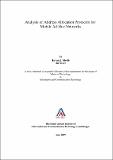Analysis of address allocation protocols for mobile ad hoc networks
| dc.contributor.advisor | Srivastava, Sanjay | |
| dc.contributor.author | Sheth, Kavan J. | |
| dc.date.accessioned | 2017-06-10T14:37:55Z | |
| dc.date.available | 2017-06-10T14:37:55Z | |
| dc.date.issued | 2009 | |
| dc.identifier.citation | Sheth, Kavan J. (2009). Analysis of address allocation protocols for mobile ad hoc networks. Dhirubhai Ambani Institute of Information and Communication Technology, viii, 71 p. (Acc.No: T00216) | |
| dc.identifier.uri | http://drsr.daiict.ac.in/handle/123456789/253 | |
| dc.description.abstract | In almost all networks, it is necessary to have a unique identifier for each node. This identifier is used to find out route locating a particular node. So an address is must for any node for unicast communication. Addresses can be preconfigured manually or can be assigned dynamically using a server (e.g. DHCP server). Manual configuration of ad hoc network is not possible for large scale networks. And setting up a server is not possible due to lack of infrastructure in Ad Hoc Networks. So it is necessary to have a mechanism by which we can allocate addresses to the nodes dynamically without any prior setup. Lack of infrastructure and mobility of nodes makes address allocation a challenging task in MANET. We present worst case message complexity analysis of a number of proposed address allocation protocols, which can be useful for estimating upper bounds for overhead and latency involved in address allocation as well as partitioning and merging. We also show that the worst case analysis is not a useful indicator of real world performance of the protocols. Buddy approach [5] is one of the many proposed approaches for address allocation. We model DPDA (A Distributed Protocol for Dynamic Address assignment in mobile ado networks)[6], a protocol based on buddy approach, to estimate the overhead involved in address allocation. We conduct simulations in NS-2 and compare with analytical results to validate our model. We perform simplified simulations using Python script which also validates the proposed model. We also do a simulation based comparison of MANETconf (MANET configuration) [8] and DPDA[6] in term of overhead and latency in address allocation, which shows that DPDA causes lower communication overhead and latency than Manetconf. | |
| dc.publisher | Dhirubhai Ambani Institute of Information and Communication Technology | |
| dc.subject | Telecommunication | |
| dc.subject | Switching systems | |
| dc.subject | Ad-hoc networks | |
| dc.subject | mobile networks | |
| dc.subject | Mobile ad-hoc networks | |
| dc.subject | Computer network protocols | |
| dc.subject | Internetworking | |
| dc.subject | Telecommunication | |
| dc.subject | Data transmission systems | |
| dc.subject | Mobile computing | |
| dc.subject | Mobile communication systems | |
| dc.classification.ddc | 621.38215 SHE | |
| dc.title | Analysis of address allocation protocols for mobile ad hoc networks | |
| dc.type | Dissertation | |
| dc.degree | M. Tech | |
| dc.student.id | 200711027 | |
| dc.accession.number | T00216 |
Files in this item
This item appears in the following Collection(s)
-
M Tech Dissertations [923]

